Samoyed is a cute medium-sized white coat dog that is adorable. The dog’s white coat and cute face make it super popular among dog lovers. The dog mostly resembles a spitz. It is a species hailing from Siberia.
Samoyed is the English name of the dog, whereas, in other languages, it is known as Bjelkier and Sobaka, respectively.
The happy-go-lucky face contour of this breed has also made people call this dog by the name smiley. The Samoyed breed has lived for around 14 years and is a domestic dog species always ready to make your day fun and happy.
What is a Samoyed Dog?
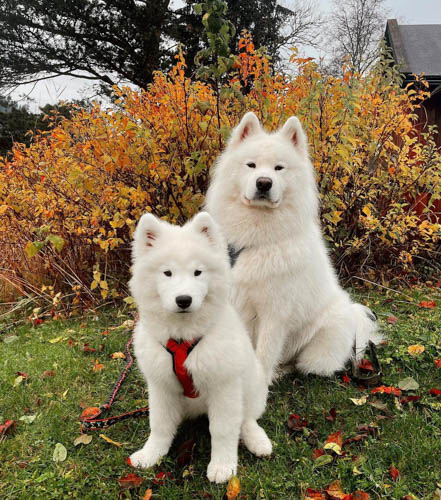
The Samoyed dog is an age-old breed, and its origin can be traced back to the 19th century. The dog emerged some 100 years back, and history says that it was native to the Nenets people who resided in the peninsular region of Yamal.
The Samoyed is a basal breed, and the lineage of the modern-day Smaoyeds are mostly Arctic/. Samoyeds were initially used for hunting and pulling carriages. They were mostly found in Siberia. Even the native names of Samoyed are also Siberian.
Samoyed dogs are a hardy species and generally not much affected by common diseases. However, the breed is vulnerable to a few genetic diseases. One of the most common diseases found in Samoyed dogs is glomerulopathy.
In this disease, the kidneys of the dogs are affected. This disease is mostly caused due to a rare genetic mutation in the X-linked allele of the dogs. Glomerulopathy is mostly observed in the males of the species.
The kidneys of Samoyeds are also prone to another type of disorder, namely nephritis. The disease is somewhat similar to Human Alport Syndrome.
Other than severe kidney disorders found in both the males and females of the species, there are several other diseases that Samoyeds face, such as Diabetes Mellitus.
This diabetes mellitus is not similar to the insulin deficiency of Human Beings. Diabetes mellitus onsets in Samoyeds at their middle age and continues for a long time since it is a chronic disease. It is an autoimmune disorder in the Samoyeds.
Physical abnormalities in Samoyeds such as deformed eyes and short leg stature are quite common in Samoyeds and these rare genetic disorders. Also, dwarfism and retinal detachment are frequently observed in multiple species members.
Other disorders are Pulmonary stenosis, hip dysplasia, and sebaceous adenitis. The exact cause of all these diseases is not yet known, and many of these are attributed to idiopathic disorders.
What does Samoyed look like?

The height and weight of Samoyed male dogs are 55 inches and 25-30 kg, whereas the females are 46-51 inches and 16-20 kg, respectively. Samoyeds have beautiful eyes that are mostly blue or brown and are nut-shaped.
The Samoyeds coats are thick and white. The whole body is white; however, sometimes, a light biscuit-colored tint is found near the ears. Samoyeds have curled tails. Samoyed coats are double layered and extremely dense.
There is a heterogenous coat composition in Samoyeds. The upper coat is long and coarse, whereas the bottom has straight and short fur hair. The undercoat is soft and short. The dogs (males of the species) have large coat hairs, whereas the bitches have relatively short coat hair.
Samoyed Temperament
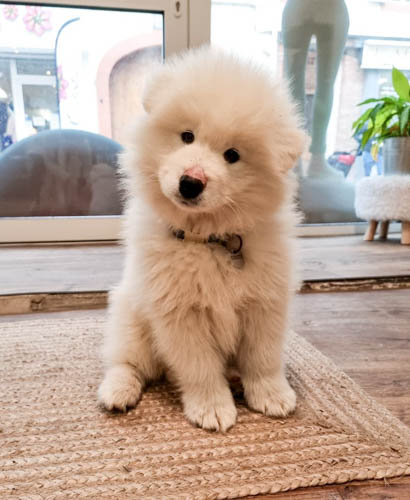
Samoyeds are smart and happy. They are extremely friendly and perfect to be the family dog. If you are looking for a ferocious guard dog, maybe a Samoyed is not good for you.
Remember, these are smiley dogs ready to cheer you up and continue dancing and making your day brighter, happier, and sunnier. If you have a kid at home, Samoyeds can be their best friends. Samoyeds and children love each other infinitely.
Samoyeds are great as companions because of their friendly and affectionate disposition. Samoyed’s love playing. They are quite active and playful, so they are loved and adored by small children.
Samoyeds are very obedient, and they listen to their masters. Owing to their lineage, Samoyeds have an inherent nature of herding. They are also seen to participate in multiple herding events.
Are Samoyed good family dogs?

Samoyeds are great as family dogs. They are friendly and can be your best companions. The dogs inherently love to be in a family surrounded by many people. Samoyeds are widely known for their loyalty towards their family members.
Samoyeds are very comfortable with the children and love to play around with your home kids. Because Samoyeds are lively and joyous and far away from being ferocious or angry, they are loved by all the family members. Samoyeds have a particular tendency to favor one particular member of the family. This is one of the unique traits of Samoyeds.
How big do Samoyed get?
Samoyeds are ideally medium-sized dogs. They are neither too big nor too small in size and weight. There exist some differences in the maximum attainable weight and height among the male and female members of the species.
The weight of the male members is somewhat between 50-65 lbs. and that of the female members are 35-50 lbs. The height of the dogs is usually in the range of 20-25 inches for both male and female members.
How much does Samoyed weigh?
The weight of the male members is somewhat between 50-65 lbs. and that of the female members are 35-50 lbs. This is the average weight of the Samoyed dogs. Dwarfism or short legs are very common among the members of this dog species.
Do Samoyed shed?

Yes. Samoyeds shed their undercoats. However, shedding is not frequent in Samoyeds and occurs only twice per year. The shedding is mostly seasonal and is termed as “Blowing Coat.” Shedding of coat twice a year applies to large chunks of hair.
The short topcoat hair strands keep on falling here and there, often just as in any other dog breed. The large chunks of hair shed by Samoyeds are used for multiple purposes because of their fine and soft texture. They are often used in knitting stuff or creating accessories for fly fishing.
How often should you bathe a Samoyed?
Samoyeds need daily grooming. As discussed earlier, the topcoat fur of Samoyeds falls off frequently, so they need regular combing.
With regular brushing, the dogs’ tendency to hair fall reduces the fallen hair on the floors and the clothes. Samoyeds have a dense coat, and they essentially need regular grooming. They need a complete thorough bath at least once a week.
During summers, the frequency can go up to 3 times a week. Because they have a dense fur coat, one cannot leave these dogs unbathed for more than six weeks. It is crucial to give the dogs a proper bath and equally important to dry them properly.
They have two thick coat layers and therefore must be dried properly to avoid getting sick. When the Samoyeds are taken care of, their coat hair shines, and they look beautiful. Samoyeds must be bathed at regular intervals and combed every day for a healthy coat.
Samoyed’s love being pampered so they can be taken for regular spa visits. Samoyeds are taken care of properly and cleansed in and out at the animal grooming salons. This helps to keep the dogs hygienic and clean for a long period.
One can use various types of comfortable towels for drying the Samoyed fur. Whenever the dogs go out for a walk or activity, removing the soils from their paws and fur is necessary.
These minute soil particles can be harmful to them if not cleaned. Samoyeds look picture perfect when kept under a proper grooming schedule. One can choose large pin brushes for regular brushing because they are easier to handle.
Samoyed fur gets tangled easily because of the two fat thick layers. Brushing regularly will keep their fur free of tangles and remove the dead hair.
If you have a Samoyed at home, it is essential to give them good hair trimming sessions, which keeps them away from matting. They need frequent haircuts to keep them presentable. Samoyeds do not stink or smell and are perfect to be your family dog.
Do Samoyed bark a lot?
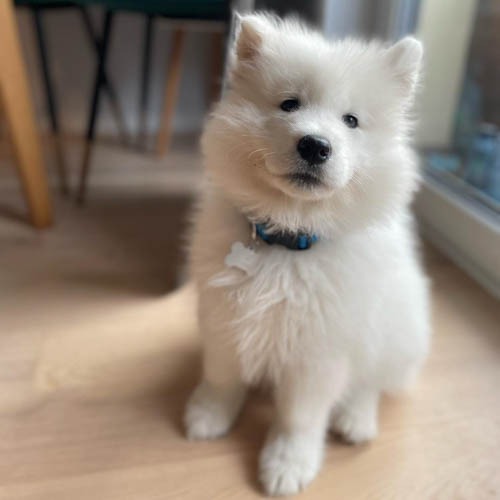
Samoyed do not bark all day long. They are friendly. Even when the outsiders arrive, Samoyed hardly do any aggressive act. With a little bit of sniffing, they become comfortable with the stranger. Samoyed hardly create any noise.
They have low to moderate barking tendencies. The only thing with Samoyed is that they need constant attention. These dogs seek attention and are hungry for attention. They get sad when ignored. The truth is that one can hardly ignore such amazing creatures when they are around.
They are social dogs. When you have a Samoyed at home, it is best to know that. Sammie does not like to sit idle. You can assign them duties to carry stuff from one pace to another, and they will be delighted to do that for you. Also, they can pull small weights and carts.
Is Samoyed hypoallergenic?
Yes. Samoyeds are hypoallergenic. The fur shed by Samoyed usually does not cause allergies. However, if someone in the family is severely allergic, they must be kept away from the fur of the Samoyed.
Samoyeds are heavy shedders, so you must consider the factor before buying one. Getting them into your house means inviting the tons of fur they will shed. You must be ready to handle all of that. If the dog owner is allergenic and cannot afford to brush the digs daily, it may be difficult to maintain a Samoyed.
Is Samoyed easy to train?
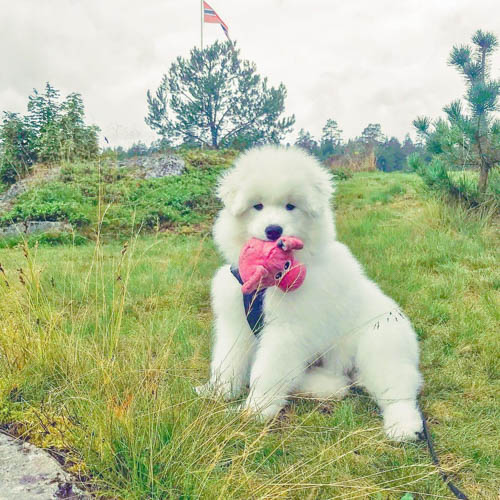
Yes, they are. Samoyeds can learn things pretty quickly. They are one of the most intelligent dog species you will ever encounter. So, it is very easy to train them. From learning new activities to adopting people, they are quick learners indeed. It is very easy to teach them etiquette as well.
Samoyed trainers would agree that they don’t have to put in plenty of effort to make the dogs learn new commands. While the Samoyeds are little adorable pups, you can teach them all the basic obedience rules, and they will learn them quickly.
This is the same reason, and if you have taught a Samoyed how to behave properly, they will never irritate your guest. Samoyeds are very intelligent and can outwit you in no time. So, the Samoyeds need good training. Samoyeds must be taught basic manners and obedience lessons right from a very young age.
You can hire a professional dog instructor for the chore or do it alone. Just google a few good tips for Samoyed dog training, and you are done. Also, the Samoyeds have the power to express what they want and how they feel.
So, if they feel neglected or unloved, their behavior will reflect the same. They can get stubborn if not trained in time. So, if you own a Samoyed, do strat the training at an early age. Training is mandatory too early if you need them to become social and cooperate with you.
Samoyed Behavior Problem
Samoyed is an amazing dog species to own as a family dog. They will play with your little ones and be your best companions. You can cuddle them and have fun with them. The Samoyeds need proper training, regular exercise, plenty of maintenance, and grooming.
All of these are characteristic features of the Samoyed Dogs. Samoyeds are intelligent and witty dogs who seek attention, and they can think on their own. That is why the Samoyeds need proper care and training.
However, the Samoyeds also have certain typical behavior; issues and can become difficult to handle if these issues are not handled with care. Let us have a glance at some of the behavioral issues of Samoyeds:
The first step is identifying that your Samoyed is having behavioral issues. If you can identify the problem early, it is easy to get the solution earlier. Samoyeds are one of the most vocal dogs one can ever find.
They are social and lovable, but they are not quiet. They bark and can be uncanny at times. These are common behavioral issues, and with proper training right from a young age, these can be easily treated.
The dog parent has to keep a close look at the barking pattern of the Samoyed. If you notice that your Samoyed is barking and making noise unnecessarily, it is necessary to immediately take them to a vet. It could be any physical or mental health-related issue of the dog that makes them bark unnecessarily.
Samoyeds are not very obedient by nature, and if the Samoyeds are not treated properly, they can become very irritating. With proper training, Samoyeds can obey commands beautifully. But if your Samoyed is not listening to your commands, maybe it is time to visit a dog behaviorist and find out about the problem.
Aggression in Samoyeds is also a common problem. The aggression in Samoyeds can be observed both towards human beings and other animals.
As already discussed, Samoyeds are vocal, and they will bark and behave differently whenever anything wrong happens to them. That is probably the first indication of them not being alright.
Another major indication that your Samoyed is not alright could be a scavenging attitude in them. Samoyeds are generally not scavengers. That means they do not scrounge on things. However, when they face danger, they will start digging the garden soil or scratch ad tear the carpets on the floor.
Samoyeds can start scratching and chewing furniture pieces if they feel anxious. These are not massive issues, and a suitable visit to a good dog behaviorist can easily help solve these problems. Usually, when the dogs feel uncomfortable, anxious, or threatened, they tend to switch to such actions.
Samoyeds also behave weirdly when facing any physical ailments. So, a change in their behavior should make the owner take the dog to the vet and then to a dog behaviorist if the conditions demand it.
How much does Samoyed cost?
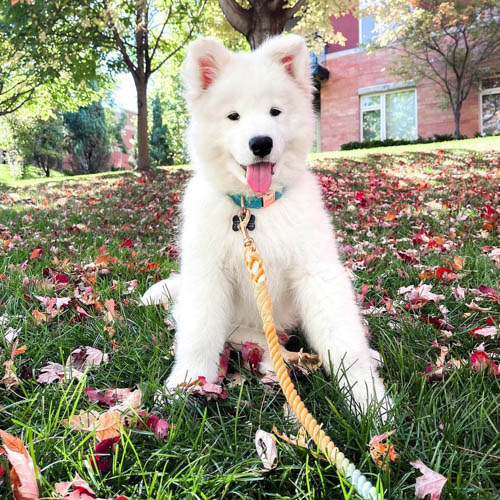
These beautiful fluffy dogs are great for your home. You can find your best friend in them. People love Samoyeds unconditionally because of their friendly nature and habits. Samoyeds usually cost somewhere between $600 and $ 1500. Multiple factors determine the price of a Samoyed.
One cannot label Samoyeds as a cheap breed, and they also are expensive to maintain. Samoyeds are expensive, and many people abstain from buying them because of their price. The health of the dog also makes a significant difference in its price.
Also, Samoyeds have multiple health risks, such as hip dysplasia. These diseases are very expensive to treat. Samoyed puppies of the best health can also cost $1500 to $2500. To avoid the onset of major diseases in Samoyeds, keeping them active and maintaining their activity level up to the mark is important.
So, overall, you need a good amount of money at hand to buy and maintain a Samoyed at its best. The grooming essentials and the grooming kits of the Samoyeds also cost a lot.
Where to buy or adopt a Samoyed Dog?
Reputed dog adoption centers or breeding centers are the best places to buy or adopt a Samoyed. Buying a samoyed can be difficult because people often confuse them with spitz.
That is why it is very important that you choose a reputed and trusted dog breeding center to get the best Samoyed. When going to a good dog breeding center, you can rely on them to sell only good and healthy pups. Also, make sure to conduct thorough research on the adoption center before making any purchase.
Do Samoyeds Need Exercise?
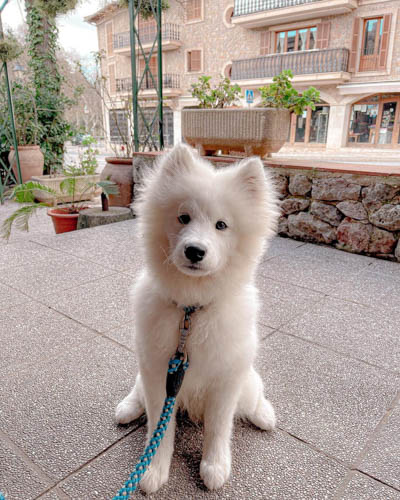
The Samoyeds need a minimum exercise of 30 minutes to 40 minutes per day to keep up their good health. Samoyeds are quite lively but not extremely. They have moderate to high energy levels.
They are joyous and playful but can be handled easily. This makes Samoyeds easy to manage and a perfect family dog. Samoyeds are very good family members because they hardly snore or drool. They are a hardy breed. With advancing age, they get stronger.
Samoyed enjoys the daily training. They become friendly with their trainers and are happy to walk, run and fetch. Daily exercise keeps them robust for a long time. The best part about training a Samoyed is that they can easily cope with the training. Samoyeds are very diligent dogs and can socialize very easily. The pretty little Sammie Smile dogs can even pull weight.
What are the bad things about Samoyeds?
The bad part about Samoyeds is that they are heavy shedders. They are cute, friendly, and amazing as family dogs, but they are heavy shedders. They shed plenty of furs, and that can make your rooms and washrooms dirty.
These shed fur will spoil your rags, carpets, and clothes. But apart from that, there is nothing bad about Samoyeds. Also, the Samoyeds are not ideal as guard dogs. Since they are not very ferocious, you cannot rely on them to guard your property while you are asleep. They are good to play around with.
Many people find identifying a Samoyed quite difficult, and many fail to differentiate it from a spitz. The crucial differentiating factor is the sparkle in the eyes of a Samoyed.
With proper care, Samoyeds can be your best friend for life. You’ll have a great time with Samoyed. This breed will provide you with complete peace of mind. So when are you getting the new Samoyed member for your family?
Reference :-